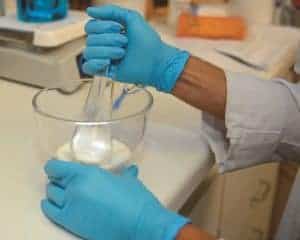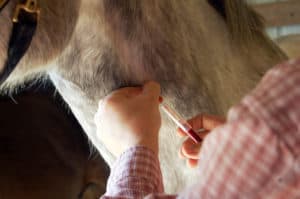
Careful Compounding
Drug compounding seems to hit the news every few years. What’s the big deal?

Drug compounding seems to hit the news every few years. What’s the big deal?

Researchers believe that estrogens could prove to be a useful early indicator of placentitis in the future.

Danish researchers recently evaluated whether practitioners could use certain blood protein levels to distinguish surgical from nonsurgical colic cases.

Researchers made recommendations for an alternative navicular bursa injection approach.

Researchers evaluated the effect of shipping mares’ oocytes (egg cells) on eventual fertilization rate.

Diagnostic testing is rarely a one-size-fits-all proposition. Here’s what you need to know.

A low-volume injection produces less upward diffusion than a high-volume injection, researchers concluded.

Veterinarians are fine-tuning testing, prevention, and treatment methods for equine piroplasmosis.

Until recently cecal cupula impactions had only been reported in conjunction with other cecal problems.

Before extracting a horse’s tooth, owners and veterinarians must consider a number of important factors.

As a licensed profession, veterinary medicine is subject to regulation at the state government level.

Learn about the organisms that cause equine protozoal myeloencephalitis (EPM) and treatment options for the disease.

Tooth extractions don’t always go as planned, so practitioners must be ready for potential complications.

Learn about tooth extraction complications and options veterinarians have for handling tooth extraction failures.

An oral sugar test might provide a more convenient means of screening horses for hyperinsulinemia.

EPM-causing organisms have a wider geographic distribution in the United States than commonly thought.
Stay on top of the most recent Horse Health news with
© 2022 Copyright Statement dolor sit amet, consetetur sadipscing User Terms, sed diam nonumy eirmod tempor invidunt ut labore et dolore magna aliquyam erat, sed diam voluptua. At vero eos et accusam et justo duo dolores et ea rebum. Stet clita kasd gubergren, no sea takimata sanctus est Lorem ipsum dolor sit amet.